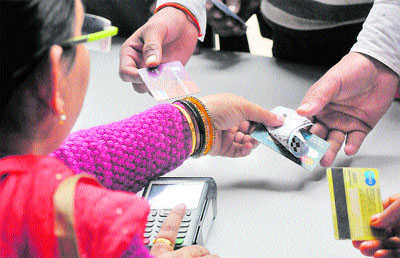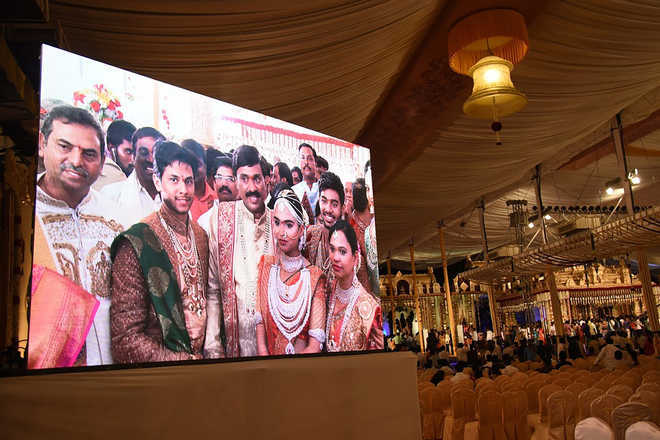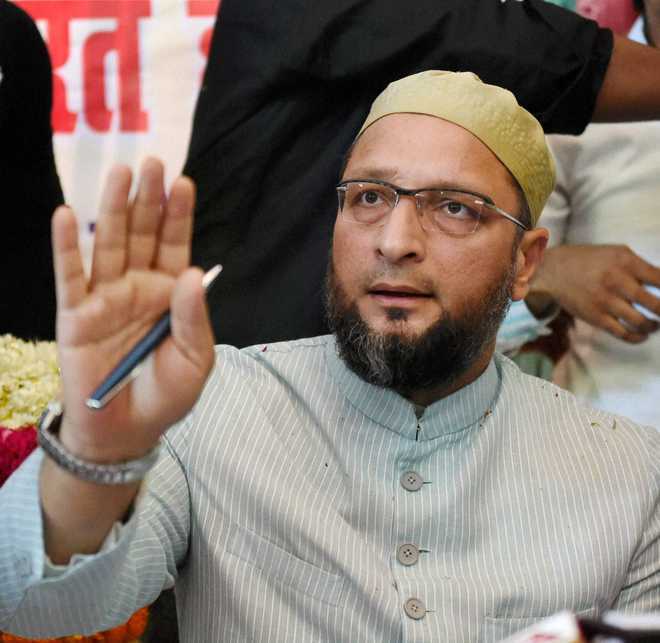There is a new belligerence in Prime Minister Narendra Modi’s public pronouncements. Not quite prime ministerial. The old traditionalists would have quite a mouthful to say about the language and tone of his last two speeches, one in Gujarat on Saturday and the second on Sunday in Uttar Pradesh. The note of bellicosity is perhaps understandable in the context of the nation-wide dismay and discontent over “note-bandi”. It is reasonable to presume that the Prime Minister and his advisers have been informed by the “agencies” as well as by the BJP’s own political networks that “note-bandi” has caused havoc in the countryside and dislocation in urban India. The BJP ministers and legislators throughout the country are avoiding stepping out as they have a reasonably good idea of public mood of anger. Even the Prime Minister’s apologists are having a difficult time in finding merit in the poorly conceived and equally poorly implemented scheme. Even if the Opposition parties can be accused of disrupting Parliament, it is difficult to avoid the impression that the Prime Minister has been reluctant to face criticism in the House. He is not used to taking criticism easily. His preferred style is to use the public platform and social media to make his argument and debunk his opponents. But as Prime Minister, Narendra Modi does not have the liberty of avoiding facing Parliament. For him to call his parliamentary rivals names is going a bit too far. The onus is always on the ruling party to ensure that the House functions effectively, as LK Advani had reminded the BJP’s parliamentary managers the other day. These managers have not done their job.Given the scale of dislocation that the botched-up “note-bandi” has inflicted on the country, the political argument between a very nervous government and a very determined Opposition will get only more acrimonious. The next few weeks could prove a defining period. It is important that the Prime Minister keeps his cool. A special responsibility dwells on the Prime Minister’s senior colleagues to advise him to be restrained and responsible, at least in his public utterances.
Digital India
Sushma Ramachandran
Mere slogan won’t work; both government and banks need attitudinal shift

pay way: It’s encouraging that the process of bringing e-transactions to the poor has begun.
THE demonetisation programme has put the spotlight on an area that has been growing very slowly in this country. This is the need for a shift to digital payments by reducing the role of cash in the economy. Recognising the need for this change, an expert committee headed by a former Finance Secretary has just presented a report on ways to make India a digital payment economy. The measures proposed may not eliminate the need for cash but are bound to make it easier and cheaper to go for digital payments. A host of much-needed incentives have also been announced by the government to give a push to digital transactions.In this context, one must reflect on the fact that certain segments of this country’s economy have simply refused to opt for electronic transactions. The reasons are various, including the need to evade or avoid taxes and also to wriggle out of other regulatory norms. At the same time, one need not be unduly harsh on such an approach, especially in the area of small business. In this country any link with government authorities necessarily implies harassment of the highest order. No wonder then that small entrepreneurs prefer to avoid brushes with officialdom and carry out their business unhindered through the cash route. In fact, one of the major hurdles in implementing the proposed Goods and Services Tax (GST) will be compliance at the retail level. The argument so far has been that since it is an easy and painless way of taxation, it will be adopted without any problems. Currently, however, the government has already launched a series of income tax raids following demonetisation. This is not likely to inspire much confidence in the small business owner who has been used to view tax officials with the utmost dread, and with reason. Tax terrorism is the right phrase for the attitude of the revenue authorities even towards regular taxpayers. Apart from this aversion to paying taxes, the small businessperson also finds it more expensive to carry out transactions via the digital route. The merchant discount rate, as it is called, is being applied in an arbitrary manner by the banking system. The RBI has fixed a cap on this merchant charge for debit cards but there is none for credit cards. The cap for debit cards was fixed at 1 per cent for transactions above Rs 2,000 and 0.75 per cent for those below this level. The latter has now been waived in the recent round of incentives. In reality, many banks charge higher than the cap for debit cards and even higher for credit cards. Despite all the drives being made in the past for financial inclusion, the banking system has continued to levy these unjustified charges to ensure higher revenues for itself. Till now, neither the RBI nor the Finance Ministry have been able to discipline banks to reduce these charges so that digital transactions become attractive for merchants as well as customers. In actual fact, there is no reason for such charges which have been imposed on an arbitrary basis, making digital transactions cumbersome for merchants and customers alike.Apart from these issues, the spread of digital payments to the rural economy is going to take a long time. The lack of infrastructure, including bank branches and ATMs, has ensured that most people in rural areas do not have bank accounts. A system of banking correspondents has been introduced but there is no data on the success or otherwise of these agents. Besides, retailers in these areas mostly lack point of sale (POS) machines. The new incentives for cashless transactions have set a target of two such devices in villages of up to 10,000 residents, but it is doubtful that those living there will have debit or credit cards to use on these machines. As for e-wallets which are now taking centre stage, the issue of interoperability is critical as otherwise the smaller e-wallets will not be viable. Unless transactions can be made from one e-wallet to another as well as from e-wallets to banks, benefits will not accrue to the customers. The actual purpose of an e-wallet is to enable a customer to move funds to any other entity, whether it be another e-wallet, banks or commercial establishments. The other issue here too is that of transaction costs which need to be reduced substantially.At the same time, it is encouraging that the process of bringing electronic transactions to the poor has finally begun in this country. Digital payments will make life easier even for the poorest of the poor if these can be adapted to their needs. It will only be possible, however, when teledensity improves in this country. Currently, only 50 per cent of rural India has access to mobile phones. Unless this infrastructure increases rapidly, it will not be possible to extend digitalisation in a big way in the short run.Even as one writes about the government’s push towards electronic transactions, it is disheartening to hear that its own departments do not seem to have heard Prime Minister Narendra Modi’s clarion call to move away from cash. The Regional Passport Office based in the Capital, it is learnt, is insisting on cash in new notes, not old currency, before handing out new passports. No debit or credit card swipe machine has reached this office which comes under the External Affairs Ministry, nor have they heard of e-wallets. This cannot be an isolated instance. There must be many other official departments that are functioning in the same old way even in the backdrop of the cash crunch following demonetisation.It is this desultory approach of government agencies that has ensured that digital transactions have grown at a snail’s pace over the years. The disruptive impact of demonetisation has forced these agencies and also the public sector banking system to finally make a push towards electronic transactions in a big way. It will thus need a huge attitudinal change in both government organisations and the banking system before any real progress is made in the arena of digital payments, in spite of the many incentives announced recently.
Ex-bureaucrat questions big-fat VVIP weddings; writes to Prime Minister
Mining tycoon G Janardhan Reddy (C) is seen on a big screen as he poses with his daughter Bramhani (2R) and son-in-law Rajeev Reddy (2L) during their wedding at the Bangalore Palace Grounds in Bangalore. — AFP
New Delhi, December 12
With demonetisation affecting weddings at large across the country with a Rs 2,50,000 cap on withdrawal for weddings, a former bureaucrat has questioned VVIP wedding extravaganzas.
E.A.S. Sarma, a bureaucrat who retired as a secretary to Government of India, shot letters to Prime Minister Narendra Modi, Congress vice-president Rahul Gandhi and also the Enforcement Directorate.
He pointed out the lavish spending at several weddings, including those of daughters of Union Ministers Mahesh Sharma, Nitin Gadkari, and Karnataka politician G. Janardhana Reddy.
(Follow The Tribune on Facebook; and Twitter @thetribunechd)
“I have written three letters to the Prime Minister, one to Finance Minister (Arun Jaitley) and to Rahul Gandhi. I have not got any reply yet,” Sarma told IANS.
He said he had sought a probe into the source of money for Reddy’s daughter’s wedding before it took place but it was not carried out.
“There was no investigation, and after the marriage was over, a junior team went but it gave a clean chit to Reddy,” Sarma said.
A twist in the tale came when a 30-year-old driver of a Special Land Acquisition Officer (SLAO) of Bengaluru committed suicide accusing in his suicide note that the officer had helped Reddy convert old notes into new currency ahead of his daughter’s wedding.
According to Sarma, around Rs 100 crore was converted.
“They have arrested the officer who colluded with Reddy, but they should have probed it before the wedding took place,” he said.
Sarma, a 1965 batch IAS officer of the Andhra Pradesh cadre, who got 26 transfers in his 35-year tenure, in his different letters pointed out at the lavish weddings, comparing them with those of common citizen.
Hundreds of commoners were compelled to cancel weddings following the note ban due to cash shortage.
“Apparently, there is one set of rules and standards for NDA ministers and another set for the common man on the street,” Sarma said in one of his letter to the Prime Minister.
“As a result of the prevailing cash crisis, many families have put off their scheduled weddings. Many other weddings have broken down. But, Gali Janardhana Reddy, Mahesh Sharma and Gadkari feel no crisis whatsoever, as they seem to have the blessings of bigwigs from both BJP and the NDA,” the letter said.
“While your ministers are indulging in such unhealthy extravagance, is it not ironic that you yourself should exhort the common man to stand in queues to uphold your grandiose mission to fight against black money?” the letter said.
In another letter to the Prime Minister, Sarma mentioned the suicide by the driver and said: ” What distresses me is that, despite my cautionary letters addressed to you, the Finance Minister, the Union Revenue Secretary, the Enforcement Director and CBI Director, all the central agencies seem to have deferred raids on Reddy’s premises till he had successfully laundered the black cash holdings and allowed the local officers to give him a “clean” chit.”
“Modiji, while the demonetisation mission launched by you is a commendable step forward, if it is established that your government is complicit in letting the money launderers off the hook, the credibility of what you have done in the name of demonetisation will certainly come under public scrutiny,” Sarma said.
Seeking a full-fledged investigation, the former bureaucrat also said that if the government does not act, he will seek “judicial intervention”.
“If you do not act quickly and firmly on these letters of mine, I will be constrained to seek judicial intervention, as every citizen in this country has the right to question the basics of governance,” he said.
In his letter to Rahul Gandhi, the former bureaucrat pointed out at the presence of Congress leaders at the wedding.
Known as an honest and upright bureaucrat, Sarma, while serving in Andhra Pradesh in 1994-95, had opposed Telugu Desam Party government’s plan to set up power plants without any competitive bidding.
When he could not overrule the government, he went on leave and later applied for a central posting.
A post-graduate in nuclear physics from the Andhra University and in public administration from the Harvard University, Sarma, in 2000, quit the finance ministry over differences in the public policy issues with the Atal Behari Vajpayee-led NDA government.
Post demonetisation of Rs 500 and Rs 1,000 notes announced by the Prime Minister on November 8, limits were imposed on cash withdrawals from ATMs and banks.
At present there is a limit of Rs 2,500 for ATM withdrawals per day and Rs 24,000 for bank withdrawals per week.
For families with weddings, the withdrawal limit is Rs 2,50,000.
However, there were reports of weddings being cancelled across the country due to the cash crunch.
—IANS
Modi a ‘tyrant’ who has caused havoc: Owaisi on note ban
Says will take a year to bring thing back to normal.
Hyderabad, December 12
In a harsh criticism of Prime Minister Narendra Modi over demonetisation, AIMIM chief Asaduddin Owaisi on Monday called him “a tyrant” who has caused havoc in every house to satisfy his ego.
Owaisi said the revolution, which Modi was dreaming to bring about with the November 8 demonetisation would never come as it had pushed people into distress.
(Follow The Tribune on Facebook; and Twitter @thetribunechd)
Stating that in one stroke the Prime Minister virtually destroyed the livelihood of the poor and deprived sections, the MP said he should remember that those standing in queues at banks and ATMs today will stand in queues on the polling day to vote him out.
“You are in power today, but tomorrow you will not be there. Many Prime Ministers came and left. You will also go,” Owaisi told a public meeting here.
Thousands attended the meeting at the All India Majlis-e-Ittehadul Muslimeen (AIMIM) headquarters to mark ‘Milad-un-Nabi’. The meeting, which began Sunday night, continued till the early hours of Monday.
Speaking in Urdu and liberally using Hyderabadi idioms, Owaisi ridiculed Modi for stating that he was a ‘fakir’.
“Will a fakir wear Rs 15 lakh suit? What kind of fakir you are who wears new clothes and new shawl with new style every day, who wants to inconvenience the poor for 50 days and who is not worried over the loss of 120 lives. You are not fakir, you are zalim (tyrant),” thundered Owaisi.
Owaisi said it would take one year and not 50 days for the post-note ban situation to return to normal.
He pointed out that economic experts have projected a loss of three percent GDP or Rs 4 lakh crore due to demonetization.
Stating that Rs.12.5 lakh crore in Rs 1,000 and Rs 500 denomination notes were deposited in banks till November 30, he asked if this was black money.
He said Modi caused distress to every family at a time when there were good rains after two years and the marriage season had just started.
He claimed that Rs 3.5 lakh crore were deposited in bank accounts between September 15 and 30 while the average deposits for the two weeks was Rs 1.5 lakh crore. “Whose money is this?” he asked.
The MP said Modi failed on all fronts including his promise to control price rise and bring back black money to the country in 100 days.
“He sometimes laughs, sometimes cries. He doesn’t know what he is doing. He says there is threat to his life. We only pray that he live for 150 years,” the AIMIM chief said.
Owaisi said the crisis offer an opportunity to Muslims to show their Islamic character and help the poor and the needy.
He urged people to ensure that no one in their neighborhood, irrespective of his religion or caste, goes hungry.
He said while everybody was facing great difficulty, it was the duty of Muslims to have empathy towards fellow human beings and share with them whatever little they have.
—IANS


